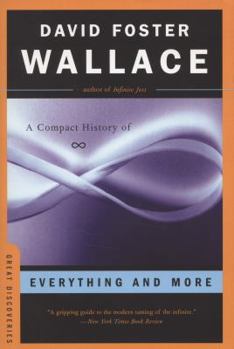Everything and More: A Compact History of Infinity
(Part of the Great Discoveries Series)
Select Format
Select Condition 
Book Overview
Is infinity a valid mathematical property or a meaningless abstraction? The nineteenth-century mathematical genius Georg Cantor's answer to this question not only surprised him but also shook the very foundations upon which math had been built. Cantor's counterintuitive discovery of a progression of larger and larger infinities created controversy in his time and may have hastened his mental breakdown, but it also helped lead to the development of set theory, analytic philosophy, and even computer technology. Smart, challenging, and thoroughly rewarding, Wallace's tour de force brings immediate and high-profile recognition to the bizarre and fascinating world of higher mathematics.
Format:Paperback
Language:English
ISBN:0393326292
ISBN13:9780393326291
Release Date:November 2004
Publisher:W. W. Norton & Company
Length:368 Pages
Weight:0.65 lbs.
Dimensions:0.9" x 5.3" x 8.0"
Customer Reviews
4 ratings
Math for Smarties (Both Informed and Un)
Published by Thriftbooks.com User , 18 years ago
I originally picked this book up for my math grad student roommate, but on his recommendation I read it after, and I loved it. I don't have an extensive math background, while he (clearly) does, but I think we both liked it equally. The book is both theory and history and, through the use of footnotes allows you to tailor the information you're receiving to make it either more elite, more basic, or just more specific. As long as the reader is interested in intellectual history he or she should enjoy the book.
Great book, but not for everyone
Published by Thriftbooks.com User , 18 years ago
I greatly enjoyed this book, but it's not for everyone. To appreciate it, there are two requirements: (1) You must enjoy, or at least tolerate, Wallace's quirky writing style, with its mixture of the conversationsal and the erudite, its frequent footnotes, abbreviations, and discursions. (2) You must have a certain level of mathematical sophistication. This is not one of those popularizations of math for those who never got past high school algebra. It could perhaps be described as a history of calculus, analysis, and set theory, and specifically of their attempts to come to grips with the infinite and the infinitessimal and make them mathematically valid. The focus is on theory and rigor--which maybe makes it sound dry, but it's not, if you like that sort of thing. It's not that Wallace himself gives lots of rigorous arguments, but that he talks a lot ABOUT the search for mathematical rigor. Reading this book is a little like sitting in on a class taught by an inspiring yet quirky professor (and, indeed, Wallace makes frequent reference to an inspiring, quirky teacher of his own). Such a class would have a prerequisite--I'm not quite sure what, maybe at least a semester or two of calculus. Probably, the more you know about calculus and related subjects, the more you'll get out of this book.
A Little Look at Infinity
Published by Thriftbooks.com User , 21 years ago
Have you thought about infinity recently? If so, it was possibly bound up in religious ideas, in some of which it is integral ("Where will YOU spend eternity?" says one local billboard). Religious infinities have lapped over into mathematical ideas in surprising ways, and if you hanker to do some serious reading about mathematical infinities and their history, you should consider _Everything and More: A Compact History of Infinity_ (Norton) by David Foster Wallace. Wallace is a novelist, author of the huge and well regarded _Infinite Jest_. He isn't a mathematician, except by avocation, but his enthusiasm for his subject is apparent on every page. It's a good thing that this is so; this is definitely not a superficial look at the subject, and Wallace calls upon some high-powered math that you may not even have done in college. The result is a penetrating book from a serious amateur on some of the most important ideas from nineteenth and twentieth century mathematics.Wallace starts his good-humored and sympathetic tone from the beginning: His "Small But Necessary Foreword" begins, "Unfortunately, this is a Foreword you have to read." There are plenty of footnotes, but half of them are marked "IYI": "If You're Interested," as are many of the paragraphs in the main text (along with "Semi-IYI"). In a history composed of increasing mathematical rigor, Wallace jokes and uses slang. Much of the history has to do with trying to solve the paradoxes of Zeno, like the one about how you can ever get to the other side of the street when you first have to go halfway, then half of the rest of the way, then half of that, and so on. The paradoxes were curious, but when supremely useful calculus came along, the infinitesimals used had never been rigorously defined. It was not until Georg Cantor showed how to deal with infinities as real mathematical entities that calculus had a mathematical foundation. He showed that infinities could be compared, and some infinities were larger than others. The proofs of these ideas (about one of which a mathematician said, "I see it, but I don't believe it!") gave calculus roots, but also gave rise to questions that eventually shook all of mathematics to its foundations.Wallace doesn't get much into Gödel and his eventual Incompleteness Theorem, and it is just as well. There is enough excitement here, at least exciting for anyone who finds paradoxes a charming way to make the neurons spin. Admittedly, he has included equations and propositions full of Greek letters and advanced functions that only math buffs will absorb. He says of Weierstrass's demonstration of continuity, for instance: "There's a reason this all looks so hideously abstract: it _is_ hideously abstract." The substance is tough going, but there is enough style here, in jokes, curious illustrations, and piquant asides, to make this a fascinating show of intellectual prowess.
A Tantalizing Tradeoff
Published by Thriftbooks.com User , 21 years ago
I think the first thing to be said of this book (or booklet, as Wallace recurrently refers to it) is that it's rather a lark to read. This will surprise no reader familiar with Wallace's literary and critical works. But, unlike his previous works, this one deals with extremely (towards the end) technical mathematics which the author is obliged to gloss over.-Quite a contrast to, say, Infinite Jest. I was, by turns, frustrated with this lack of rigour, and appreciative of it. I can't put it better than Wallace does in a footnote on pp.220-221, "Rhetoricwise, let's concede one more time that if we were after technical rigor rather than general appreciation, all these sort of connections would be fully traced out/discussed, though of course then this whole booklet would be much longer and harder and the readerly-background-and-patience bar set a great deal higher. So, it's all a continuous series of tradeoffs." - Informed readers take note of his use of the term "continuous series" here!Thus, Wallace does the best that I think any writer could in walking the tightrope between over-the-top technical mare's nests which only a few members of the faculty at Mathematics departments (and a few autodidacts) could grasp, and what he derides as the "Pop" accounts of such things as the development of Set Theory.-So, nobody, including Wallace, and myself, is going to be completely satisfied. While not a complete technical purist, I do wish he'd chosen to be more technical in some parts and less so in others. As a former student who has always wished his "formal" training in Mathematics went further that first year college Calculus (though I later worked my way through more advanced textbooks on my own), I was genuinely interested in the technical illuminations this book might provide. On the other hand, as an appreciator of fine writing, I know the two do not go hand in glove.So, in the end, I should say that this book is as good a "tradeoff" as you're going to find. I was pleased to see that Wallace's wit and style haven't suffered from the subject matter. He rather resembles, in this respect, another writer who is more often quoted herein than any other for, as Wallace terms it alliteratively, his "pellucid prose": to wit, Bertrand Russell, a mathematician of first order, whose renegade life and pixie wit served him well throughout his (as Wallace puts it, wryly, in the penultimate footnote of the "booklet") long, distinguished life. Let's hope Wallace's life and output are equally as long and energetic.
Everything and More: A Compact History of Infinity Mentions in Our Blog

How Do Books Make Life Better? Let Us Count the Ways...
Published by Beth Clark • January 07, 2019
Aside from the obvious self-help category, books make life better in so many ways that it's hard to imagine existing without them...so we won'! Thankfully, we don't have to. Here are just some of the ways that reading books is as essential as, oh, breathing.





